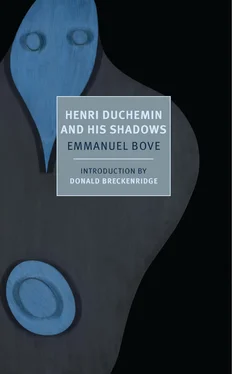Birds sang and flapped their wings, ready to fly off again should the branches sag too much beneath their weight. The sun was setting. A buzzing life was being reborn with the first chill of evening. Other insects, those that like the rain, emerged from the cracked earth.
I continued to gaze at the house as I walked. Certain details began to make it familiar to me. A fence separated the yard from the vegetable garden. I recognized the curtains, the bench in front of the ground-floor window, a shovel whose smooth handle was worn thin from use. I saw a brand-new zinc pail that did not seem out of place because it had not been used without me. The trees had not grown taller.
I had only about fifty yards to go. My family would soon be in the dining room. My mother would be preparing supper. My father would be reading in his study. My sisters would be sewing.
I advanced slowly. My pulse, my temples, all my veins were throbbing in unison. Again I pictured the scene I had imagined so many times: the hugs, the tears, my parents’ happiness. It would happen as I had foreseen. There was no reason for me to have been mistaken because, until now, everything was just as usual.
Tears came to my eyes, mixing with the perspiration on my face. Yet they were cooler as they fell.
I would be forgiven for having taken the money, for having made a scene before I left, for having gone five years without writing.
Then, smelling the sweet scent of the grass, it suddenly seemed to me that what I had done was much more serious than I had thought, that I would have to beg them to let me stay, beg them to forget.
Everything I had imagined was fading in the buzzing life all around me that would continue until evening, impervious to my motives and the complexities of my thoughts.
I was now very close to the house. I did not dare enter yet. I had placed my hand on the fence that surrounds our property. A bush from our yard concealed me. Because it belonged to us, and because it seemed to become my accomplice, for an instant I regained my confidence.
I did not have the strength to take another step. I, who had believed everyone would laugh together and feel sorry for me, sensed that I would be unable to utter a single word. I had a dizzy spell. Now, with all my heart, I hoped someone would come out and see me. I would have fainted then. They would have carried me. I would have woken up in a bed with my family at my side, attentive to all my gestures.
But no one came. I heard my sister singing, my mother speaking, but did not see anyone even though the windows were open.
For a second I let go of the fence to test myself, to wipe my forehead from which new perspiration was dripping. I almost fell. I stumbled. With both hands I again grabbed the fence that the rain had turned a greenish color. I wanted to call for help. The memory of what I had done, along with the hope that I would recover, stopped me.
Suddenly my father came out of the house in his shirtsleeves. I saw him clearly. I bent down and spied on him through the leaves where a world of insects was teeming in the coolness. He did not see me. I was no longer his son. I was hiding, watching him intently without his being aware of it, like a burglar. He went into the garden. He was carrying a light, empty basket. He had aged. I was so shaken by this that I was not sad.
Five years ago, even when it was very hot out, he would never remove his jacket, he would hold himself erect and never go into the garden. I was the one who fetched the vegetables.
I wanted to run to him then, throw myself at his feet, beg him to forgive me. But I did not budge.
He passed in front of me again, slowly, turning around at the sound of a rooster crowing. Soon I saw him from behind, stooped over, sadder it seemed because he was going back into the house.
It was too late to follow him, to stop him. My father was leaving me outside.
I could no longer remain like this, hidden. I had to go in.
I forgot everything and, letting go of the fence, I took a step, then two.
I was about to go in. The great moment had arrived. My father, my mother would see me, look at me before they recognized me.
I raised the latch on one of the gates. I was in the yard. I stopped short and stood straight, motionless, my hands needing no support because the ground was level.
No one was in the courtyard. In my blurred vision, the line of the horizon seemed to spin as I looked at it. No tree, no bush concealed me. I was facing the walls of the house, the window, and the slope of the roof at which I had tossed balls as a child.
A few yards lay between me and the door. All I had to do was walk straight ahead on the cleared ground, uncluttered now by any pail, wheelbarrow, or basket.
Suddenly my gaze fell on the walls whose thickness I could see in the embrasures, on the objects made of wood and iron, on the bench, the shovel, the stones of the well and, for a second, on the chickens moving about at my feet. A clear voice rose from all that. I did not understand the meaning of what it was saying. My ears buzzed. I stiffened. One by one my calm, my strength, my will abandoned me. A groan escaped my throat. Because of the stables nearby, and a dog sleeping on the warm sand, it drew no attention.
I took another step. I waited, my body bathed in sweat, my chest heavy. As in a dream, I couldn’t catch my breath. I felt as though I had collapsed, that I was lying on the ground, that my feet were as close to the sky as my head.
I could not bear anymore. Even if I had continued moving forward, I would not have seen the door, I would have crashed into a wall. I was incapable of going any farther. I took a step backwards, without taking my eyes off the house. My breath returned to normal. Relief flooded my body. The chickens, more active now, pecked. The ground, in the shade, was slowly cooling off. A bird tried to carry off a wisp of straw. A sudden calm fell over the garden, the courtyard, the house, as if all I had to do was move away for the calm to return.
Slowly I reached the road. My dusty shoes had been wiped clean by the grass. I was coming back to life. Without turning around, I headed toward the village. The sun was setting behind me. It stayed with my parents’ house. My long shadow preceded me. I spared it from colliding with the trees, the piles of stones. I was calm. I tried not to think.
On the hill, when I reached the spot where the house had appeared to me when I arrived, I turned around.
The house rose between the two trees already dark against the blue sky. One window was closed. A single pane flashed. The day was coming to an end in the same peacefulness as the previous day. I felt guilty for having almost disturbed it.
A puff of warm air that the insects followed enveloped me. I looked one last time at the countryside that had not changed, that surrounded the house I was leaving forever, and I went on my way.
When the clock struck ten, Monsieur Marjanne began to worry. For the third time, he called the maid.
“Irene, madame didn’t tell you anything?”
“Honestly, no, monsieur!”
“Did you see her go out? How was she dressed? Did she have her suede purse?”
Monsieur Marjanne had noticed that whenever she went to a friend’s house or to the theater, his wife preferred her suede purse to any of the others.
“I didn’t see madame go out.”
Once alone, Robert Marjanne paced in the living room for a few minutes, then went into his wife’s bedroom. Everything was locked. He had never managed to get her to leave the drawers unlocked when she went out. “I don’t need the servants reading the letters you used to write to me. That’s nobody’s business,” she would respond whenever he said “What an odd habit you have of locking everything up like this!” It was useless for him to point out that Irene did not know how to read. The drawers he could open contained only insignificant things. He remained for a moment in the room, looking for something abnormal, then, returning to the living room, sat down in an armchair.
Читать дальше












